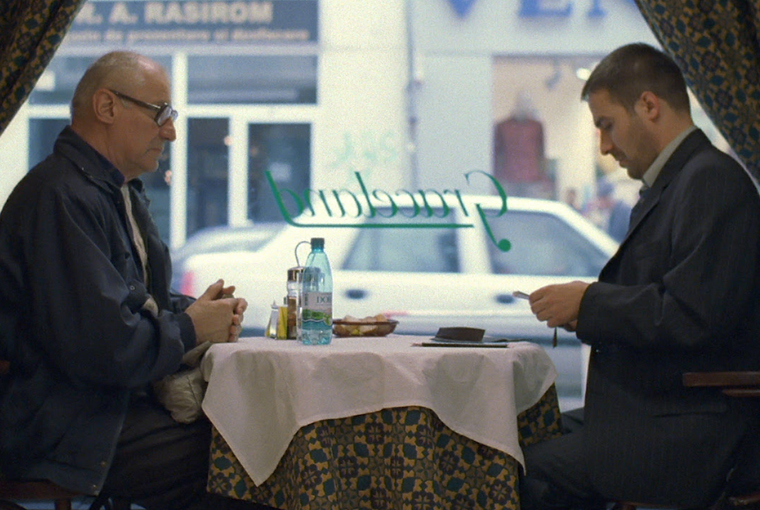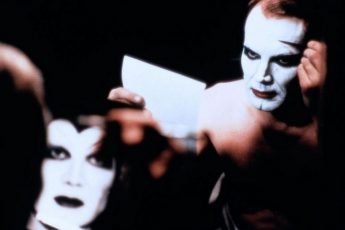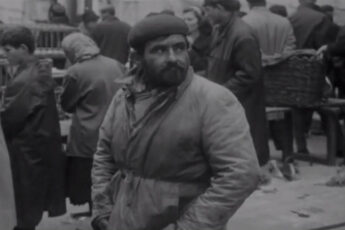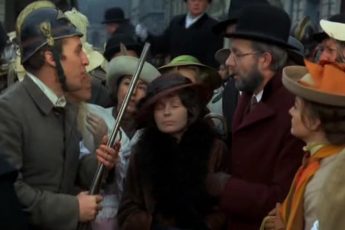Silence and Speech
Cristi Puiu’s Cigarettes and Coffee (Un cartus de kent si un pachet de cafea, 2004)
Vol. 7 (July 2011) by Moritz Pfeifer
In Jim Jarmush’s Coffee and Cigarettes, friends meet to romanticize about their love for two savory customs. Cristi Puiu’s Cigarettes and Coffee turns Jarmush’s film around. Neither Fiul (Mimi Branescu), a young man dressed in a suit, nor Tatal (Victor Rebengiuc), his poor looking father, smoke or drink coffee as they meet in a bar to talk business. Instead, they have water, beer, and apple pie. And unlike the character’s in Jarmush’s film, Fiul’s and Tatal’s conflict is not to come to terms about myths on tobacco and caffeine. The old man in Puiu’s film actually has a serious problem.
Tatal has been working as a driver for the most part of his life, and looses his job two years before retirement. He counts on his son’s help, and although Fiul cannot offer work for a driver, he found his father a post as a night guard. Here, coffee and cigarettes come into use, as there is no job without bribing the person in charge. This is realism speaking. Puiu’s characters deal with cigarettes and coffee almost as if they were living in times of war where cigarettes replace currency and are traded into goods increasing the chance of survival. In Jarmush’s film on the other hand, everything is artificial. Drinking coffee and smoking cigarettes is praised as a subversive life-style. The film’s charm is provided by the aimless attitude of a bunch of oddball celebrities over-identifying with the poetic meaning of having a smoke. So if the black-and-white sequences in Jarmush’s film stimulate nostalgic memories for a smoke-friendly past, Puiu answers with the bleak, low-contrast colors cultivated by the realist attempts of the Romanian New Wave. Puiu turns Jarmush’s philosophical delicatessen into social symbols that separate a simple father from his nouveau-riche son.
Like almost all of Puiu’s films, Cigarettes and Coffee is about incommunicability. Tatal doesn’t know what Lavazza (the coffee brand) is, which seems to embarrass his son. He is also annoyed by his father’s efforts to do small-talk and not getting to the point. Unlike his father, Fiul has a job, and therefore no time to hang around chatting in bars all day. As Tatal wants to discuss all the possible ways public transportation offers to arrive at the restaurant, Fiul interrupts and commands him to tell him about his work situation. The film is a verbal power play. Everything the father says is refuted or ignored by the son, and everything the son says is avoided by the father. As Fiul tells his father about the job as a night watch, Tatal repeats that he can also work as a welder. But there is no such a job offer. He then gives his son his work record, as if to prove his professionalism, still not accepting the other job. Fiorel ignores the record and starts to talk about something else. Then all of a sudden, Tatal half-way agrees talking about being able to pay for his wife’s medicine, provided that he earns money as a night guard. He accepts the job. But oddly, this is again rebutted by his son, who tells him that he is the one paying for her medicine, thus implying that there is no need to work as a night guard. In short, the dialogue is absurd, almost like a social-realist version of a Beckett play. The peak of this to-work-or-not-to-work-discussion is presented by a little wooden massage tool in the shape of a car that Fiul finds in the package containing the coffee and the cigarettes. It’s a gift with a hidden message. Tatal bought it for his wife, but as he demonstrates how to use the object on his son’s arm, it becomes clear that he still wants to believe that he is a driver.
In Puiu’s last film, Aurora, a portrait of a murderer, the communication problems of the main character, Viorel, are one of the reasons he kills. In Aurora, there are practically no dialogues, and Viorel refuses to say more than he has to say. He is opposite to the talkative Tatal. The few conversations Viorel has however, share much with Fiul’s ruthless straight-forwardness. Similar to Viorel, result-oriented speech seems to be the only way for him to communicate. Both characters have a hard time deciphering non-verbal messages or dialogue that is not concerned with some concrete subject. That’s why Fiul doesn’t understand his father’s “gift,” that’s why he continues to talk about the job and not about his father’s apparent financial problems, and most of all about his father’s despair of having lost a job he identified with. Fiul, like Viorel, lacks empathy, or else he would be able to deal with his father’s condition, closer related to someone having lost an ideal than to someone looking for a job. But the first condition demands empathy, the capacity to see someone’s personality, wheras the second condition can be attributed to anybody. Cigarettes and Coffee is about an impersonal relationship of a son to his father.
In response to those critics that complained about the quantity of images showing the main character in Aurora neither in conversation nor in “significant” action, Puiu said that he will make a film only with dialogue, as to show that more dialogue doesn’t solve the problem. Here is a short-film that works entirely through dialogue, and that exposes two characters who are unable to communicate. Silence is broken, but so is speech.




Leave a Comment